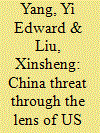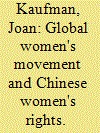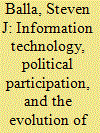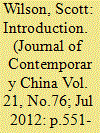|
|
|
Sort Order |
|
|
|
Items / Page
|
|
|
|
|
|
|
| Srl | Item |
| 1 |
ID:
112835


|
|
|
|
|
| Publication |
2012.
|
| Summary/Abstract |
China scholars have examined the 'China threat' theory from various theoretical perspectives, offered a range of explanations for the theory's emergence and forecast the potential implications for US-China relations. However, few scholars have empirically studied the 'China threat' theory through the lens of the US media. This is a critical oversight, because the media plays a pivotal role in shaping US public opinion and US foreign policy, and the media is a key channel for 'China threat' dissemination and popularization. This study seeks to redress this oversight by empirically examining 'China threat' coverage in the US print media over a 15-year period from 1992 to 2006. We use content-analysis methodology to systematically collect, code and analyze 'China threat' data from five major US newspapers and to track the frequency and content of this coverage over time.
Our analysis reveals many interesting patterns in 'China threat' media coverage. First, the initial emergence of 'China threat' arguments in the US print media corresponded with the sharp upward turn in China's economic growth rates in the early 1990s. However, since the early 1990s, 'China threat' coverage has not mirrored China's steady growth. Rather, the media coverage was cyclic, featuring three key peaks (1996, 2000 and 2005) followed by subsequent declining interest. Second, our analysis reveals that the focus of these stories also varied over time. Perceptions of China as a political/ideological threat dominated media coverage in the earlier years (1992-1994) but steadily declined after 1995 and totally disappeared from the US print media after 2001. Perceptions of China as a military/strategic threat replaced political/ideological concerns in 1995, and the military focus has dominated media coverage ever since. Perceptions of China as an economic/trade threat persisted steadily throughout the 15-year time period with a clear uptick in recent years. We conclude this analysis by turning to the literature on realism, agenda setting and information processing to offer possible explanations for these empirical trends.
|
|
|
|
|
|
|
|
|
|
|
|
|
|
|
|
| 2 |
ID:
112830


|
|
|
|
|
| Publication |
2012.
|
| Summary/Abstract |
Since the mid-1990s, China's navy has witnessed remarkable progress in force-projection capability build-up which has enabled it to move from coastal waters to the deep oceans. The continuing naval modernization process has aroused deep-rooted suspicions and two prevailing assumptions that these new capabilities will be used to challenge US maritime dominance and to fulfill national reunification of Taiwan. This article examines the validity of the hypotheses and points out that China has neither the intention nor the capabilities to pursue these objectives. By referring to the priority on China's defense agenda and imminent threat identification, this article suggests that naval modernization will enhance China's capabilities to contribute to global commons, including protection of sea lanes of communications and addressing nontraditional security threats, which will provide new opportunities and dynamics for China-US cooperation, rather than for confrontation.
|
|
|
|
|
|
|
|
|
|
|
|
|
|
|
|
| 3 |
ID:
112832


|
|
|
|
|
| Publication |
2012.
|
| Summary/Abstract |
The massive worldwide protests initiated by China's angry youths (Fen Qings) over biased reports on the Tibet issue in the West in 2008 and perceived unfriendly actions toward China's Beijing Olympic Games shocked the world. Although scholars and the media have shown great interest in China's Fen Qing phenomenon, there is no serious scholarly research. Based on interviews, investigative field trips, and an exhaustive web search, this paper explores the Fen Qing phenomenon. Through an analysis of three cases, namely, the anti-CNN Web, the Han Han phenomenon, and the '69 Holy War', it distinguishes three types of Fen Qings: nationalistic, China-critical, and resentment-venting. These Fen Qings vary in the people who constitute them, the causes of their anger, and their targets. The paper places the Fen Qing phenomenon in the broader context of China's socio-economic transformation and its relations with other countries.
|
|
|
|
|
|
|
|
|
|
|
|
|
|
|
|
| 4 |
ID:
112829


|
|
|
|
|
| Publication |
2012.
|
| Summary/Abstract |
The global women's movement is an example of a successful transnational civil society movement that is a mechanism for the globalization of ideas, aided more recently by the Internet. Two UN conferences, the International Conference on Population and Development in Cairo in 1994 and the Fourth World Conference on Women in 1995 in Beijing, advanced women's rights in China. The Beijing conference was a galvanizing event for the Chinese women's movement and a transformative experience for the All China Women's Federation (ACWF). The official UN meeting and NGO Forum provided opportunities for global interaction by the ACWF and NGOs working on women's rights. These connections transformed work on two issues affecting women's rights in China: the family planning program and domestic violence.
|
|
|
|
|
|
|
|
|
|
|
|
|
|
|
|
| 5 |
ID:
112833


|
|
|
|
|
| Publication |
2012.
|
| Summary/Abstract |
Although information technology is playing a fundamental role in China's political development, relatively little is known about the contours of online participation in government policymaking. This article presents the results of a survey of individuals who, in 2008, used the Internet to submit comments on the central government's plan to reform the nation's health system. The responses demonstrate that participants were, in the aggregate, well-educated professionals who live in urban areas and were especially likely to work in the medical and health industry. Substantial numbers of participants commented as a means of expressing concerns about the overall direction of reform, as well as on specific elements of the proposal itself. Participants generally anticipated no more than a modest degree of government responsiveness, although high expectations were held for comments from government officials and individuals who worked in the medical and health industry. Overall, these attributes and attitudes are illustrative of the evolution, as opposed to transformation, of the political system that is occurring in online contexts where neither democratization nor the legitimacy of the Chinese Communist Party is of immediate salience to government officials and societal stakeholders.
|
|
|
|
|
|
|
|
|
|
|
|
|
|
|
|
| 6 |
ID:
112827


|
|
|
|
|
| Publication |
2012.
|
| Summary/Abstract |
Since 1978, China has opened itself, not just to the global economy, but also to social movements and non-governmental organizations (NGOs) in global civil society. Scholarship on Chinese NGOs and civil society has reflected these developments, contrasting the state's early attempts to eradicate and control civil society organizations with more recent acceptance of, and even reliance on, the NGO sector. Two factors-linkages between Chinese NGOs and international actors and online communications-have propelled Chinese civil society development. Yet, Chinese civil society remains uneven across geographic and issue areas. This introduction examines the opportunity structures presented to Chinese NGOs by international and online linkages, as well as introduces the articles collected in this special section (in two parts).
|
|
|
|
|
|
|
|
|
|
|
|
|
|
|
|
| 7 |
ID:
112828


|
|
|
|
|
| Publication |
2012.
|
| Summary/Abstract |
In 2003 the Chinese Ministry of Education mandated the inclusion of environmental education in all elementary and secondary school curricula, but this mandate has gone widely unfulfilled. Under these circumstances, international and domestic NGOs in China are playing important roles in teaching Chinese children about environmental issues. While these roles have included the importation and dissemination of cosmopolitan conservation concepts and practices, their successful implementation often depends upon a sensitive engagement with the specifics of local culture and ecology. This essay discusses the experience of one domestic environmental NGO that develops local learning materials (xiangtu jiaocai) to help Chinese children 'learn the land beneath their feet'.
|
|
|
|
|
|
|
|
|
|
|
|
|
|
|
|
| 8 |
ID:
112836


|
|
|
|
|
| Publication |
2012.
|
| Summary/Abstract |
The People's Republic of China's turbulent experience during the Cold War (1949-1991) has been followed by a remarkably tranquil period. Although conflict and crisis have certainly not been completely absent in the post-Cold War era, the PRC has managed to undertake three decades of 'peaceful rise' or 'peaceful development'. What explains this remarkably peaceful great power ascent? Prominent scholars, such as Thomas Christensen and Iain Johnston, stress the utility of the security dilemma in understanding the PRC's security behavior since the end of the Cold War. Can the PRC's peaceful rise in recent decades be attributed to a realization of the centrality of the security dilemma in great power politics acquired during the Cold War? This paper concludes that the security dilemma does not seem central to China's thinking about its relations with other powers, including the United States.
|
|
|
|
|
|
|
|
|
|
|
|
|
|
|
|
| 9 |
ID:
112834


|
|
|
|
|
| Publication |
2012.
|
| Summary/Abstract |
Since the turn of the millennium, a second generation of Chinese civil society organisations (CSOs) have started taking on issues such as rural migrant integration, social service provision, as well as community building. Organisations such as Beijing-based Shining Stone Community Action (SSCA) can be seen as the avant-garde of a second wave of humanistic, community-based CSOs which are willing to help improve the strained state-society relationship in the People's Republic of China (PR China). In order to advance their values and interests, civil society practitioners are willing to engage with Chinese government officials. By gaining the trust of First-in-Command (FIC) cadres they manage to introduce ideas such as the principle of subsidiarity, solidarity and reciprocity. Civil society practitioners thereby initiate open-ended processes of communication, consultation and cooperation. Such processes help promote cross-sector collaboration between Chinese civil society organisations and local government agencies. These developments signify an incremental change from government control (guanzhi) to public management (guanli) and to network governance (zhili). As a framework for the case study the authors look at strategies for the establishment of cooperative relations, focusing on steering mechanisms and process factors. In order to further understand the dynamics of cross-sector collaboration they further explore the social capital dimensions of the principle of reciprocity and trust. To evaluate outcomes and impacts of cross-sector collaboration, the authors discuss the ability of collaboration partners to produce tangible results and to innovate. The findings show that successful experiments with cross-sector collaboration not only depend on structural factors but also on the skills and strategies of the individuals and organisations involved.
|
|
|
|
|
|
|
|
|
|
|
|
|
|
|
|
| 10 |
ID:
112831


|
|
|
|
|
| Publication |
2012.
|
| Summary/Abstract |
The China-US relationship is a multidimensional complex one involving both traditional and nontraditional security issues. However, nontraditional security issues (NTS) have become paramount in reshaping Sino-US relations, though there is no absolute boundary between NTS and traditional security. With both traditional security issues and NTS issues being solved according to the involved nations' prior experience in dealing with traditional security matters, it stands to reason that there is a very fine line, if that, between NTS and traditional security and that they are not necessarily mutually exclusive. Although the energy threat is more likely to be considered a traditional security matter than concerns such as the terrorism threat or climate change issue, the energy threat actually contains some NTS characteristics, like how to get full use of natural resources and the relevance with climate change. This article, to some extent, explains the dynamic between traditional and nontraditional security through the case study of China-US relations.
|
|
|
|
|
|
|
|
|
|
|
|
|
|
|
|
|
|
|
|
|